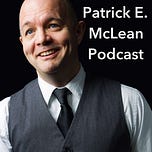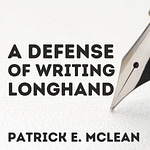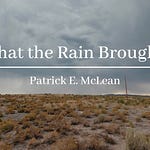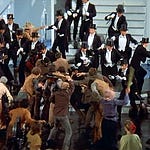Author’s Note: This is the first in a seven-episode podcast/serialization of Patrick E. McLean’s new novella. It will be available on Amazon and where ever audiobooks are sold shortly. But in the meantime, if you want the whole thing, you can subscribe and get it all right now.
Beowulf and the Dragon
CHAPTER ONE
Cold. No wind. No hope.
The men stood on the walls of the Ringfort, staring down at the fires of the enemy encampments. The smoke rose in unbroken columns, rising and rising and rising until it dissipated among the cold, indifferent stars.
As the King walked the wall, he knew better than to try and count the fires on the plain. Too many, too many and one, too many and two.
The King stopped and warmed himself by one of the watch fires. He felt the men’s secret, sidelong gazes. They looked to him for signs of fear and for reasons to hope, but they dared not speak. After a time, the King said, “If we went down there, we would find that most of those fires are empty.”
“I will follow where you lead, my liege,” Heathgan said, and was rewarded by grim laughter.
“Don’t be so eager,” the King said, clapping Heathgan on the back, “They’ll be in your lap the morning. Who knows? After climbing the hill, they may even be too tired to fight.”
The men laughed because it made them feel better to act brave. But when the laughter died away they all stood as equals before death.
When he was no longer able to hide his fear, the King descended from the walls. In this desperate hour showing weakness, even in front of his most loyal me n, could be fatal. He felt twice-prisoned in his strong place upon the hill. So it was that the Thane, Lord and Ring-giver of this strong house of Geats, sought to hide himself away in the stable.
In the stable, a small coal fire had been set in a brazier. And this place, at least, had the smell of warm, contented animals. He almost knew a moment of peace, but from the darkness, came the sound of steel scraping across stone. He put a hand to his sword and turned.
There, clad in little more than rags and filth, was the stable boy, sharpening a long knife. The King laughed, but like all of his laughter this night, it rang hollow. He was troubled by the eyes that peered out from beneath the mop of unkempt black hair. All this long night the King had wandered through his fort, cheering and comforting his men. His scarred and tested men had done their best to put on a brave face for their commander, but they were no fools. Everyone knew what the dawn would bring. And in every man’s eye he had found fear. But not in the stable boy’s. The boy did not flinch beneath his King’s gaze. Instead, it was the King who looked away.
The King asked the stable boy, “You are thinking of battle?”
The only answer the boy gave was the rasp of edge across stone.
The King laughed at this and said, “At least you've got the good sense to sit inside by a fire instead of standing on a cold wall looking down at your doom.” He pulled a wooden stool close to the warmth of the brazier, drew his sword and sat with the flat of the blade across his thighs.
The boy sharpened.
The King threw a few more hunks of charcoal in the brazier and said, “We are both sleepless on the eve of battle. But which of us has the most excitement, and which most dread?"
The boy sharpened.
"Has anyone told you stories of Beowulf, who was King before me?” the King asked.
"You are my King, and I have no other before you,” he said, grinding the metal.
"No, no, not me. I am just what was left over. A small man who managed to survive from an age of heroes. I am not one of those men who warred with giants and the monsters they bred. It is of Ecgtheow's son, Beowulf whom I would speak. A true Geat and a true King. I am…” the King faltered, not wanting to give voice to the full depth of his failings.
“But you,” the King continued with a wry smile, “You are not a Geat. You were brought here. A Scyllan collected on a raid? Scyllan like those who camp outside our walls?“
This earned the King one sharp nod.
“Did you know that I was also taken? I am by birth a Scythian. Only my people never came to rescue me.”
“You mock me.”
“A little. I mock myself more. None in that horde at the bottom of the hill will recognize you, nor will claim you if they do. Not in the heat of battle which is to come. It is well you sharpen that knife. You will need a blade, ere the morrow is finished with us. And just as you will need that blade, I will need every man and boy if any of us are to survive.”
"As my Liege says.”
“I can see the murder in your eye. You would kill me with that knife of yours, drop over the wall into the snow, and take your chances with the Scyllans.” The blade stopped grinding against the stone.
“Who told you?”
“No one told me, boy. Do you imagine you are the only slave who has ever had hate in his heart? But you fear for your skin, if not for your soul, and that makes a coward of you, as it did of me.
"Are you a Christian, then? Like those at the bottom of my hill? One true God, eh? I can see a God with one eye, but one God? Only one!?!” He paused trying to make sense of it. “It’s too bleak. What if he doesn’t pick your side in the battle? That's it, eh? What happens when there are two armies of your own kind? Is your God torn then? How does he decide?”
“The Lord, my God, protects the meek.”
“Haven't you heard the songs they sing around their campfires? Far from meek. They believe victory is in their grasp. They are no heroes. They are small men like the rest of us. They are not on the scale of the ones who came before, of Beowulf.
“When the Geats took me they came out of the mist, like a nightmare. They had drawn their long ships up upon our shores in the dead of night. It takes a brave man to sail by the light of the moon. The kind of a man who is not afraid of swimming alone in the open ocean even among monsters.
"They rode our village down on short ponies, stubby little animals, not like these noble steeds,” He gestured to the drowsing horses around him. “I thought it was funny when I saw those warriors coming through the morning fog on ponies. But I stopped laughing when I heard my mother scream.
“When she was pierced by a spear. I could only stand there, unable to believe that she was dead. As I tried to get her to rise, I was knocked down. I rolled under a cart. For a time I hid my face as battle rang out around me. I thought that if I did not open my eyes again until my mother called me, she would not be dead.
“It was when I heard my father cry out that I opened them. The battle was all but over. The village was ablaze. But even so, my father called out for their leader, for him to fight, in the old way, man to man, to settle the battle.
“They cut him down?" asked the lad, warming to the tale.
"That's what you or I would have done, because you and I are small men of good sense and low cunning, but it is not what Beowulf did. My father was a blacksmith, a huge man. I still remember how he fought with his sword in one hand and his hammer in the other. He kept five men at bay as he yelled his challenge.
“Then a voice called ‘Halt!’ A man in a battered shirt of chainmail dismounted and removed his helmet. Those eyes. Such a gaze Beowulf had. And why not? He had seen wonders and terrors as have now been banished from our gentled earth. Even before I knew his tale, I could see the memories of those things reflected in his eyes. In a few generations, they will just be stories, only good for scaring children. But to see those eyes for yourself, lad, was to know that those things were not tales. That once they had been real.
"Beowulf, was not even a King then. He was just a mighty captain, deep in the bloody work of carving out a domain from the world of men. He drew his sword and cast it aside, just threw it away as you might a discard a chicken bone you had just gnawed clean. Even I knew you shouldn't treat a weapon like that, but swords had failed him in the past, and he no longer trusted them.
“He walked right up to my father, within range of both his sword and hammer, and looked him in the eye. It is still strange that my father did nothing. As I see it now, he could have just stabbed him,” the King thrust the tip of his sword into the coals, causing the guttering flames to flare and jump, “just like that. But my father stood there, until Beowulf said, ‘Well?’”
“Then my father swung and Beowulf spun out of the way. He grabbed my father’s arm as he turned. My father tried to break free, but Beowulf just laughed. Not a deep laugh, but a surprised chuckle. Before my father thought to swing the hammer, there was a snapping noise. Beowulf broke my father’s arm and then stabbed him with his own sword.
"I could hear nothing. I could think nothing. The horror of it has never left me. And even though I have done horrible things and ordered worse, it is that day I have carried with me.”
The stable boy’s jaw was hanging open. He shut it with a clacking of teeth.
“Beowulf looked at my father’s sword and the blood on it in disgust, then hurled it into the woods. He turned his back and walked away. Even though I was only a boy of six, I went for him. I loved my mother and my father. What was left for me but a good death in battle and a place in the mead hall of Valhalla? I picked up my father’s hammer and charged. So strange, I was not afraid of death then. But now, having seen so much of it...” The King paused with the strangeness of his realization.
The stable boy asked, “What happened?”
“He backhanded me into the mud. I struggled to rise. Hell, I struggled to breathe. He said, ‘You’ve got fight in you.’ Then everything went black.”
“And then?” the stable boy asked.
The King shrugged. “The stable, just like you. And while I hated the man who had killed my mother, my father, and my entire village, I was powerless to do anything about it.”
The King pointed at the boy with his sword. “People were less trusting then. They didn’t let me have a knife. Not at first. I had to learn to hide my hate to get a chance at revenge.”
“And did you?”
“Did I what?”
“Kill him? Isn’t that how you became King?”
“That is how one becomes a victor. And there is a world of difference between winning a Kingdom and keeping it.”
“But did you?”
The King smiled. “And why should I tell you my tale as you glare at me from across my own fire?" When the boy did not answer, the King said, "I will make you a bargain. I need every man tomorrow. But, I do not think you are fully committed to our cause.”
The boy smiled for the first time.
“So I will tell you my tale, and if it convinces you that I am a King worth fighting for…”
The boy spat on the stone and resumed grinding the edge.
“Then you will fight for us at dawn.”
“It’s a false bargain,” said the boy, “If I don’t agree to fight for you, you will have me killed.”
“I could kill you now. If I cry out, even if you do manage to slip your well-sharpened blade between my ribs, you will die within moments.”
“If I listen and do not agree, will you let me go?”
“No,” said the King. “I will do better. I will cast aside my sword, like mighty Beowulf, and give you the chance to slip your knife in my belly.”
“Why would you do that?”
The King sighed and cracked one of his knees. “Because I’m old and tired. Because I am no hero, and not much of a King, at least not in the way that men once were Kings. Tomorrow I die, one way or another. I do not believe in the stinginess of just one God, but such Gods as I believe in… well, let’s just say, I have been a King long enough to appreciate how convenient it is that the only way to get into Valhalla is for man to die in battle.”
“You are a godless man,” said the stable boy, not a question, but a statement of fact.
“So you can kill me, and it will seem that I committed suicide. My men will break, perhaps there will be no battle. But like as not they — your good Christian Scyllans — will kill everyone in the name of their One True God anyway. You’ll be dead. I’ll be dead. But since all of that seems fated to happen anyway, at least you will have the satisfaction of your revenge.”
For a long time there was silence. Then the knife touched the stone again. “Deal,” said the boy.
“First, what is your name?”
“Hargth.”
“Very well, Hargth. My name, my true name, is Wiglaf. And this is my tale.”











